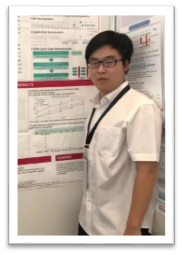BAQIS Postdocs received funding from China Postdoctoral Science Foundation
2022/07/04
On June 30, 2022, China Postdoctoral Science Foundation officially announced the recipients list of the 71st General Program Funding. Dr. Liangyu Ding, Dr. Xiaotian Song and Dr. Xiang Zhang received the second class funding for physics, with an amount of ¥80,000.
 The approved project by Dr. Liangyu Ding is "Quantum simulation of non-Hermitian systems based on trapped ions", which aims at experimental study on open quantum system. The project will develop the trapped ion system and realize a quantum system with controlled interaction with the environment based on the multi-level structures of trapped ions. On this basis, a series of non-Hermitian systems, including quantum dissipative systems, higher-order exceptional points, parity-time-reversal symmetry models with multi-qubits, will be studied intensively to explore the application of non-Hermitian systems on specific problems. This project will further develop quantum simulation experiments with trapped ions and increase research interest in non-Hermitian systems in order to promote the related technical progress of quantum information processing experiment.
The approved project by Dr. Liangyu Ding is "Quantum simulation of non-Hermitian systems based on trapped ions", which aims at experimental study on open quantum system. The project will develop the trapped ion system and realize a quantum system with controlled interaction with the environment based on the multi-level structures of trapped ions. On this basis, a series of non-Hermitian systems, including quantum dissipative systems, higher-order exceptional points, parity-time-reversal symmetry models with multi-qubits, will be studied intensively to explore the application of non-Hermitian systems on specific problems. This project will further develop quantum simulation experiments with trapped ions and increase research interest in non-Hermitian systems in order to promote the related technical progress of quantum information processing experiment.

The approved project by Dr. Xiaotian Song is "Research on thin-film lithium niobate circuit for quantum communication". This project mainly aims at the requirements of quantum communication system, carries out the feasibility study on the implementation of decoy state modulation, phase modulation and other codec modules on thin-film lithium niobate platform, solves a series of key scientific problems such as overall scheme,chip design, chip manufacturing and testing, and achieves the goal of preparing chips for high-speed quantum communication on thin-film lithium niobate platform, which will lay a foundation for the development of quantum communication chip technology on thin-film lithium niobate platform.

 The approved project by Dr. Xiang Zhang is “Magnetoelastic coupling beyond the phase transition and its influence on the thermal dynamics of 2D antiferromagnetic membranes”. The project aims at analysing the thermodynamic properties for the 2D antiferromagnetic membrane under variational temperatures. Especially it focuses on the temperature range beyond the phase transition within which the breaking of antiferromagnetic order would induce anomaly for detectable observables such as the thermal expansion coefficient, thermal conductivity, and membrane quality factor. Dr. Zhang plans to look into the physical origin of these anomalies by modeling the spin Heisenberg Hamiltonian and explores the coupled thermal-elastic-magnetic free energy. As a result, it will extend the traditional non-magnetic Gruneisen relation into the case of including the magnetic contribution. The project would provide another tool of investigating the magnetic phase transition apart from the Raman spectroscopy. It also suffices an ideal platform to study the membrane optomechanics integrated with the magnetism tunning from the temperature control.
The approved project by Dr. Xiang Zhang is “Magnetoelastic coupling beyond the phase transition and its influence on the thermal dynamics of 2D antiferromagnetic membranes”. The project aims at analysing the thermodynamic properties for the 2D antiferromagnetic membrane under variational temperatures. Especially it focuses on the temperature range beyond the phase transition within which the breaking of antiferromagnetic order would induce anomaly for detectable observables such as the thermal expansion coefficient, thermal conductivity, and membrane quality factor. Dr. Zhang plans to look into the physical origin of these anomalies by modeling the spin Heisenberg Hamiltonian and explores the coupled thermal-elastic-magnetic free energy. As a result, it will extend the traditional non-magnetic Gruneisen relation into the case of including the magnetic contribution. The project would provide another tool of investigating the magnetic phase transition apart from the Raman spectroscopy. It also suffices an ideal platform to study the membrane optomechanics integrated with the magnetism tunning from the temperature control.
After expert evaluation and the publicity of the evaluation results, 3880 postdocs has been granted the 71st General Program Funding of China Postdoctoral Science Foundation. Chinese Postdoctoral Science Foundation is a national research fund for postdoctoral researchers, which aims to encourage outstanding postdoctoral researchers with great development potential to carry out innovation researches and to develop a high-level innovative postdoctoral talent team. Finance of Chinese Postdoctoral Science Foundation is mainly funded by the central financial allocation.
 中文
中文 Email
Email QCloud
QCloud Log in
Log in
